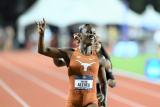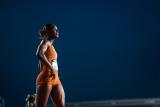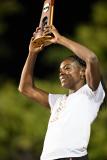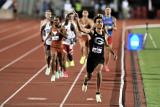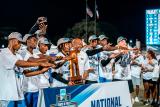Folders |
Pick 6: Performances That Lit Up The Men's NCAA Track and Field FinalePublished by
Unpacking Friday's Top Feats, Starting With Will Sumner's 800 And Turner Washington's Last Word In Discus By David Woods for DyeStat Bert Richardson/Jamison Michael photos AUSTIN, Texas – Here is a list of top performances from the Friday night men’s windup of the NCAA Division 1 Championships. (Plus honorable mention.) It is a subjective list. Yours will be different. That is one of the admirable features of track and field: passionate fans holding strong opinions. 1, Will Sumner runs stunning second lap to win 800 meters. No matter how impressed you were by Georgia freshman Will Sumner, what he did was more impressive than you imagined. In clocking a facility record of 1:44.26, he negative split with laps of 53.12/51.14. Sumner climbed to No. 5 on the all-time collegiate list, met the World Championships standard of 1:44.70 and ran the fastest 800 by an American this year. He ranks No. 8 in the world behind seven men who ran in the 1:43s Friday at Paris. At 19, Sumner could be headed to August’s World Championships at Budapest. When he bolted ahead with a half-lap left, the move looked potentially foolish. Instead, he kept separating from NCAA indoor champion Yusuf Bizimana, who ran a PB of 1:45.74 for second place and was still left in the Texas dust. “I didn’t really expect anyone to take it, so that’s why I wanted to go position myself in the front,” Sumner said. “I could have done a little more to make it a little more honest, but I just wanted to be as relaxed as I could be, and 53 ended up being the number, I guess.” I tried to locate runners whose second laps were as fast as 51 seconds. Know who I found? Herb Elliott, Jim Ryun, Steve Ovett, David Rudisha. At the 1958 Empire Games at Cardiff, Wales, after a dawdling 58.8 first lap, Elliott built a lead and held off Brian Hewson, 1:49.3 to 1:49.5, for 880 yards. (Subtract 0.6 for 800 meters.) Elliott ran the second lap in 50.5 and Hewson in 49.9. That was no 1:44 race. This was: On June 10, 1966, at Terre Haute, Ind. – nearly 57 years ago to the day – a 19-year-old Ryun set an 880-yard world record of 1:44.9 off laps of 53.3/51.6. (That’s equivalent to 1:44.3, or the same as Sumner.) At the 1980 Moscow Olympics, Ovett won the gold medal in 1:45.4 off 54.9/50.5. At Kenya’s 2012 Olympic Trials in Nairobi, Rudisha was credited with 52/50 in running 1:42.12. Sumner, of Canton, Ga., came out of high school with 45.78/1:46.53 credentials. He said he would weigh options about turning pro, citing resources and NIL money as reasons to stay in college. “If a deal comes up that I can’t pass up, I would probably take it,” he said. 2, Turner Washington wins discus on last attempt, then strips. Hard to determine which was more epic: Turner Washington’s last-round throw of 217-3 (66.22 meters) or his celebration afterward. He roared loudly, tore off his shirt and tossed it into the crowd. He said someone in that area of the stands was taunting him, and that was his response. The Arizona State senior, who won a shot/discus double in 2021, lost the shot put to Arizona’s Jordan Geist in the last round Wednesday by two centimeters. “That was my last NCAA throw. It was like, ‘Let’s put something together and let’s create a moment,’” Washington said. He was aiming for a post-meet moment, too. “I’m going to give my girlfriend a big kiss,” he said, “and I’m going to see what Austin, Texas, has to offer.” Arkansas' Roje Stona, representing Jamaica, had held the lead at 215-0 (63.25m) and finished second. Washington upset Cal’s Mykolas Alekna, a 20-year-old Lithuanian. Alekna won a silver medal in last year’s World Championships and on April 29 became the youngest to throw beyond 70 meters, setting a collegiate record of 232-11 (71.00m). Alekna fouled his first two attempts and finished third at 207-6 (63.25m). Afterward, he suggested he didn’t take the meet seriously enough. “Maybe I was too confident this time,” he said. “It’s a very good lesson. Hopefully in the future, I’ll learn from it.” 3, Quarter-milers say, ‘See ya later, Gator.’ Florida’s Emmanuel Bamidele (44.24) and Ryan Willie (44.25) became the first teammates to go 1-2 over one lap since Southern California did so at 440 yards in 1942. Bamidele, of Nigeria, and Willie rank Nos. 4-5 in the world this year. Then they helped the Gators lower their collegiate record in the 4x400 relay to 2:57.74, fastest in the world. They bettered their 2:57.76 from SECs. Florida has gone back-to-back in the 4x400 in 2022-23 and 2012-13. After five teams ran sub-3:00 in Wednesday’s semifinals, the only others in the final were Arizona State at 2:57.78 and UCLA at 2:59.82. ASU recorded the No. 3 time in collegiate history behind Florida’s two. 4, Ky Robinson kicks again to complete 5K/10K double. As he did in Wednesday’s 10,000 meters, Stanford’s Ky Robinson had too much closing speed in the 5,000 and completed a distance double in 14:04.77. He is the first to win a 5K/10K sweep since Oregon’s Edward Cheserek in 2015-16. Robinson had a final 400 of 55.54. Harvard’s Graham Blanks was second in 14:06.53, overtaking Wisconsin’s Jackson Sharp, third in 14:06.77. Stanford’s Charles Hicks, second at 10K, was sixth in 14:09.03. Robinson, a 21-year-old Australian, said he comes from a hot climate and was ready for Austin’s heat and humidity. “I mean, I feel like I’m about to wake up from a dream,” he said. “This is something I wanted to do in my four or however many years that I’m here at Stanford.” Northern Arizona’s Nico Young, second to Hicks in NCAA cross country, shook up the field with 400s of 60.94 and 64.02 ahead of the last two laps. Young finished eighth in 14:10.17. Washington’s Brian Fay, a 5K/10K double winner in the Pac-12, was a non-scoring ninth. Tennessee’s Dylan Jacobs, the 2022 NCAA champ at 10K, did not start. 5, Texas Tech sprinter first in 100, second in 200. Given the quality and global diversity of the 100/200, Courtney Lindsey should perhaps rank higher. The Texas Tech sprinter from Rock Island, Ill., clocked 9.89 to win a 100 in which seven men broke 10-flat. He is tied for third in the world and tied for No. 4 on the all-time collegiate list. LSU’s Godson Oghenebrume, of Nigeria, was second in 9.90 and Houston’s Shaun Maswanganyi, of South Africa, third in 9.91. The race followed soon after Texas Tech had apparently won the 4x100 relay. The Red Raiders were instead disqualified. “We were very disappointed,” Lindsey said, “but I had to keep my head focused and go out there and try to score for my team.” Stanford’s Udodi Onwuzurike, another Nigerian standout, won the 200 in 19.84, followed by Texas Tech’s Lindsey (19.86) and Terrence Jones (19.87), representing the Bahamas. Lindsey and Jones tied for Nos. 7 and 9, respectively, on the all-time collegiate list. 6, Washington’s trio of milers, all NCAA champions. Tactical 1,500s at NCAAs can be wildly unpredictable, except for one thing: A Washington Husky in first place. Washington’s Nathan Green and Joe Waskom navigated the traffic and sped to a 1-2 finish in 3:42.78 and 3:42.93, respectively. Waskom was defending champion and 10th-place Luke Houser is the indoor mile champion, giving the Huskies three milers who are all NCAA champions. Green, 20, is a sophomore who has a 3:37.46 PB. He credited success to team culture. “I mean, there are no rivalries. There’s no, ‘I’m trying to be better than Joe,’” he said. “We’re just trying to be better together.” Green closed in 51.88 and Waskom in 52.16. Wisconsin’s Adam Spencer closed in 52.23 to finish third in 3:42.98. Waskom and Green are the first teammates to win back-to-back since Oregon’s Andrew Wheating and Matthew Centrowitz in 2010-11. Honorable mention >> Arkansas freshman Jaydon Hibbert won the triple jump with a distance of 57-7.50 (17.56m). (The Jamaican set a collegiate and World under-20 record of 58-7.50/17.87m at SECs.) With Carey McLeod winning the triple jump, Arkansas is the first to have teammates win long and triple jumps since Erick Walder and Brian Wellman, also of Arkansas, did so in 1992. >> Arkansas’ Phillip Lemonious, also a Jamaican, won a 110 hurdles race in 13.24 in which the top five were separated by .07. >> Onwuzurike, after a 19.76 in Wednesday’s heats, became the first to win the 200 for Stanford since Clyde Jeffrey won at 220 yards in 1939. Jeffrey won the AAU 100 meters that year in 10.2, tying Jesse Owens’ world record, but the time was wind-aided and ineligible for records. >> Alabama’s Chris Robinson (48.12) and Corde Long (48.53) became the first men’s teammates to go 1-2 in the 400 hurdles. >> South Florida's Romaine Beckford responded to Oklahoma's defending champion, Vernon Turner, in the high jump, clearing a personal best 2.27m (7-5.25) on his first attempt. His ability to get over 2.24m on his second try (to Turner's third) was the difference in the competition, as Beckford completed the indoor and outdoor championship sweep. >> BYU's Kenneth Rooks and Montana State's Duncan Hamilton, two of the best steeplechasers in NCAA history were going down the final backstretch together and it appeared that Hamilton might be able to pick his spot and overtake the Cougar. But Rooks flew in the final 200 and gap kept growing and growing, until it was six seconds at the finish line. Rooks' winning time of 8:26.17 was a facility record, giving BYU its first title in the event since Kyle Perry in 2009. Contact David Woods at [email protected]. Follow him on Twitter: @DavidWoods007. More news |



